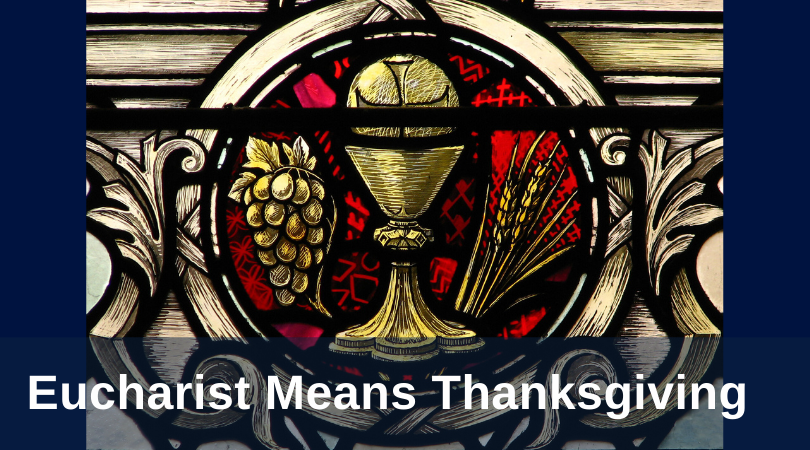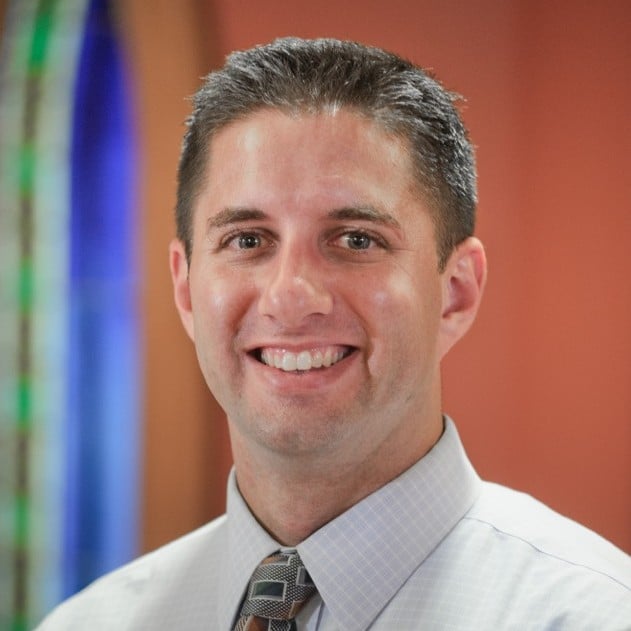
We at the McGrath Institute for Church Life want to observe and celebrate Thanksgiving in a special way. On our radio show and podcast, Church Life Today, we shared five passages about the Eucharist and thanksgiving, with reflections to guide us into rediscovering how an exchange of thanksgiving occurs in the Sacrament of Sacraments. We know, of course, that the holiday Thanksgiving is not itself about the Eucharist. But this civic holiday is probably the closest in character to our religious holidays, and all the more because it is a feast dedicated to giving thanks. For those who revere and adore the Eucharist, we know that being transformed by that particular and unique “thanksgiving” should shape and transform our entire lives.
Here are the five passages shared in our episode “Eucharist Means Thanksgiving.” Click the button below to hear the full podcast.
1. Eucharistia Means Thanksgiving
Eucharistia means thanksgiving. How wonderful that Jesus gives thanks by endlessly offering himself and making a gift of himself to God and to men! Whom does he thank? Most certainly, he thanks God the Father, the model and ultimate source of all giving. . . . But he surely also thanks the poor sinners who are willing to receive him, who let him enter under their unworthy roof. Is there anyone else whom he thanks? I would say that he thanks the poor Maid from whom he received this flesh and blood through the overshadowing of the Holy Spirit. . . . What does Jesus learn from his mother? He learns to say Yes, fiat. Not just any Yes, but a Yes that goes ever farther, without getting weary. Everything that you desire, my God…. ‘Behold, I am the handmaid of the Lord, let it be done to me according to your word.’ . . . This is the Catholic prayer that Jesus learned from his human mother, from the Catholic Mater who was in the world before him and who was inspired by God to be the first to speak this word of the new and eternal covenant.
Joseph Ratzinger [Benedict XVI], quoting Hans Urs von Balthasar in The God of Jesus Christ: Meditations on the Triune God, 2nd Edition (Ignatius Press, 2018), 84–85.
2. A Tent Worthy of Heaven
When I am preparing for Holy Communion, I picture my soul as a piece of land and I beg the Blessed Virgin to remove from it any rubbish that would prevent it from being free; then I ask her to set up a huge tent worthy of heaven, adorning it with her own jewelry; finally, I invite all the angels and saints to come and conduct a magnificent concert there. It seems to me that when Jesus descends into my heart He is content to find Himself so well received and I, too, am content.
St. Thérèse of Lisieux, Story of a Soul, chapter 8.
3. Love (III)
Love bade me welcome: yet my soul drew back,
Guiltie of dust and sinne.
But quick-ey’d Love, observing me grow slack
From my first entrance in,
Drew nearer to me, sweetly questioning,
If I lack’d any thing.
A guest, I answer’d, worthy to be here:
Love said, You shall be he.
I the unkinde, ungrateful? Ah my deare,
I cannot look on thee.
Love took my hand, and smiling did reply,
Who made the eyes but I?
Truth Lord, but I have marr’d them: let my shame
Go where it doth deserve.
And know you not, says Love, who bore the blame?
My deare, then I will serve.
You must sit down, says Love, and taste my meat:
So I did sit and eat.
George Herbert, “Love (III),” quoted in Robert Imbelli, Rekindling the Christic Imagination (Liturgical Press, 2014), 58.
4. O Boundless Charity
O boundless charity!
Just as you gave us yourself,
wholly God and wholly man,
so you left us all of yourself as food
so that while we are pilgrims in this life
we might not collapse in our weariness
but be strengthened by you, heavenly food.
O mercenary people!
And what has your God left you?
He has left you himself,
wholly God and wholly man,
hidden under the whiteness of bread.
O fire of love!
Was it not enough to gift us
with creation in your image and likeness,
and to create us anew to grace in your Son’s blood,
without giving us yourself as food,
the whole of divine being, the whole of God?
What drove you?
Nothing but your charity,
mad with love as you are!
St. Catherine of Siena, quoted in Leonard J. DeLorenzo, Turn to the Lord (forthcoming from Liturgical Press, 2021), Part 1: chapter 9.
5. The Spirit of Christ
The Spirit opens our eyes in order that we may recognize the Lord; he gathers up our hearts so that we may receive the Word; he intensifies our hunger so that we may be filled with the Bread of Life; he makes us die to ourselves so that we may rise with Christ; he becomes our joy so that we may become the Father’s joy; he breathes through us so that we may give life to our brothers and sisters.
Jean Corbon, The Wellspring of Worship (Ignatius, 2005), 147.
Church Life Today hosts pastoral leaders and scholars in discussions about some of the most important theological, social, and ministerial issues in the Church. Click the button below to listen to the full episode:
Featured image by Fr. Lawrence Lew, O.P.; CC-BY-NC-2.0.



